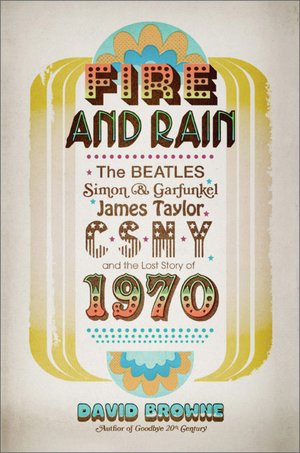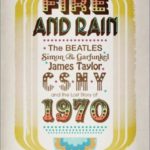
Da Capo
A copy of David Browne’s Fire And Rain: The Beatles, Simon & Garfunkel, James Taylor, CSNY and the Lost Story of 1970 should be handed out to students in every institution of learning across this fair land – for (at least) two reasons.
First, American History teachers should make Fire And Rain required reading. Browne’s story moves beyond the music to offer an accurate portrait of America’s cultural and political climate as the 60s waved goodbye and the door to the 1970s opened wide.
Secondly, Browne has turned facts (not dirt; not supposition; not opinion – facts) into a well-crafted, totally engaging history that reads like a novel. This could be fodder for any number of educational courses – when you can make history this entertaining, you’ve accomplished something.
Browne weaves a very readable tale of cultural and political change, beginning with a 1/3/70 Beatles recording session at Abbey Road (Lennon was absent, in Denmark with Yoko and quoted in that morning’s Record Mirror as saying, “I suppose it is a lot more difficult for us to get together now because everyone is involved with different things.”) and ending with Billboard naming Simon & Garfunkel’s “Bridge Over Troubled Water” the year’s best-selling single and a young James Taylor the recipient of its “Trendsetter Award.”
In the course of the twelve months between, the world witnessed the horror of Kent State and the beauty of the first Earth Day; the birth of Greenpeace and the death of The Beatles; and the United States terrorizing itself with bombings. Art Garfunkel jeopardized his partnership with Paul Simon by pursuing an acting career, while James Taylor’s musical career received a shot in the arm from his role in Two-Lane Blacktop.
Sweet Baby James, Let It Be, Bridge Over Troubled Water, and Deja Vu were all released – the first was a hello; the next two turned out to be goodbyes; and the fourth was one island in a turbulent sea of talent and egos. The resulting soundtrack to the year is impressive: from the Beatles’ efforts both together (“Let It Be”, “The Long And Winding Road”) and solo (“Instant Karma”, “My Sweet Lord”, “Maybe I’m Amazed”, “It Don’t Come Easy”) to the members of CSNY chronicling America’s struggles (“Ohio”, “Southern Man”) and their own (“Cowboy Movie”, “Only Love Can Break Your Heart”, “Better Days”).
And along the way Browne finds the parallels between the various musical camps, from friends and lovers to shared musical talents. Sometimes the connections spawned magic; other times they contributed to the upheaval and implosions.
Fire And Rain: The Beatles, Simon & Garfunkel, James Taylor, CSNY and the Lost Story of 1970 is a wonderful read for both those who lived it and those who wish they had. In either case, there’s much to be learned.



No Comments comments associated with this post